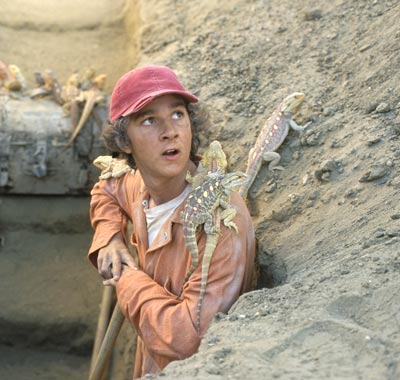 Again, this is another book that I’ve seen since I was a kid but never got around to reading. My cousin Dianne convinced me to get my own copy after she bought hers, and I decided to read it one afternoon.
Again, this is another book that I’ve seen since I was a kid but never got around to reading. My cousin Dianne convinced me to get my own copy after she bought hers, and I decided to read it one afternoon.Holes is about Stanley Yelnats IV, a kid who has the knack of being at the wrong place at the wrong time, thanks to a family curse cast by Madame Zeroni on his ancestor Elya Yelnats.
Because of the curse, Stanley gets wrongly convicted of a juvenile crime and is sent away to Camp Green Lake for some disciplinary action, except the camp isn’t all that he expected it to be.
Stanley is in for a great adventure that allows him to put the family curse to rest, find buried treasure, survive yellow-spotted lizards, gain wisdom and inner strength, and forge the friendship of a lifetime, along with a chain of coincidences and quirky twists of fate that are delightfully tied in with the story.
 The 2003 Walt Disney movie stars Shia Le Beouf and Sigourney Weaver. Let’s hope Disney channel airs this one soon; I think that except for the body type, Shia fits the character perfectly.
The 2003 Walt Disney movie stars Shia Le Beouf and Sigourney Weaver. Let’s hope Disney channel airs this one soon; I think that except for the body type, Shia fits the character perfectly.
Postscript: someone from one of my book clubs read the book recently and commented that it didn’t exactly present something new for the YA genre.
I think that’s exactly why the book is so charming– it doesn’t try to reinvent the wheel. The best young adult books for me are those that succeed without trying to impress you, dealing with issues its readers can relate to but still making it fun.
***
My copy: trade paperback movie cover, upgraded into hardcover with dustjacket
(I also have the hardcover sequel, plus Stanley Yelnats’ guide to Camp Green Lake in my TBR.)
My rating: 5/5 stars
Photos courtesy of http://www.fantasticfiction.co.uk
http://www.tribute.ca



